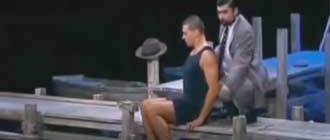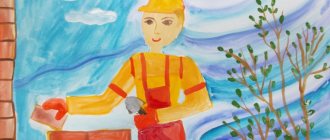Summary of OOD in the preparatory group of a preschool educational institution on the topic: Professions
Summary of OOD “There are many professions in the world, it is impossible to count them.”
Senior preschool age senior preschool age Objectives: - Expand children's understanding of the variety of professions and specific work activities.
— Form a generalized concept of “profession”, enrich the active vocabulary. — Develop attention, memory, thinking. — Foster positive motivation for learning and respect for the work of adults. Progress
Educator: Hello, guys! Today is an unusual day, I am sincerely glad to see you. I suggest you say hello. Game “Friendly Palms” We put palm to palm and offered friendship to everyone. We will play together so that we can become kind and smart. Do we offend each other - no, no, no Do we respect each other? Yes! Yes! Yes! Educator: - Children, which of you wants to grow up quickly and become an adult? Tell me, where do your moms and dads, adults, go every day? Children: adults, mothers and fathers go to work Educator: -Why do people go to work? Children: to earn money, build houses, drive cars, grow bread Educator: -What do your parents do? (ask each child) -What benefits do they bring? Children: they sew clothes, teach children, treat the sick, prepare food, transport goods. Educator: -Before we start talking about the diversity of the world of professions, I would like to play a warm-up game with you. Assignment: I will name groups of words, and you need to determine what profession we are talking about. 1.Form, rod, holster. (Policeman)
2. Ladder, hose, water.
(Firefighter)
3. Syringe, clinic, animals.
(Veterinarian)
4.Cap, stove, delicious dish.
(Cook)
5. Laws, acts, contracts.
(Lawyer)
6.Camera, navigator, movement.
(Driver)
7. Course, schedule, chassis.
(Pilot)
8. Scales, counter, goods.
(Seller)
9. Hammer, chisels, nails.
(Carpenter)
10. Machine, scissors, cut.
(Seamstress)
11. Magazine, rules, textbook.
(Teacher)
12. Carrier, block, system.
(Programmer)
13. Keel, spire, mast.
(Sailor)
14.Defense, client, court.
(Lawyer)
Well done!
Reading the poem “What do you want to become, children?” What do you children want to become? Answer us quickly! - I want to be a driver. Carry different loads. — I dream of ballet. There is no better one in the world. — I want to become a great doctor. I will treat everyone with medicine. Very tasty, like candy. I ate it - no disease! — I don’t like colors. I dream of becoming an artist. Order me a portrait. I can handle it, no doubt! - You, friends, don’t argue with me, I want to become the first in sports. Scoring the puck is a trifle for me, I play for Spartak! — I want to become a pianist. A wonderful artist. Music has been with me since childhood, I love it with all my heart. — I dream of becoming a children's teacher soon. Sing, walk, play with them. Celebrate birthdays Teacher: - What is the poem talking about? Children: the poem talks about professions. Educator: What does the word “profession” mean? Profession means:
business, work, occupation.
People work what they like to work with, do what they do best. There are many professions in the world. Name the professions that you know? Children: teacher, driver, worker, salesman, doctor, builder. 2. Statement of the problem situation. Educator: - Guys, is it hard to imagine what we will do without doctors when we get sick? - What would we wear if there were no tailors?! — What would you eat if it weren’t for the work of people who grow bread, vegetables, and fruits? - How empty and uncomfortable would our room be if it weren’t for the joiners and carpenters? 3. Discovery of something new. Game “What is he doing? » Goal: Continue to familiarize children with the actions of people in different professions. I name a profession, and you answer what a person in this profession does. Doctor - treats Teacher - teaches Doctor - treats Salesman - sells Cook - cooks Educator - educates Driver - drives a car Builder - builds All professions are needed, all professions are important. The main thing is to do your favorite job well. 4. Game “Who needs what for work?” Goal: To consolidate children’s understanding of the subjects of each profession. — People of different professions use different tools for their work. I have a “wonderful chest” that contains many interesting things. To find out what lies there, you need to say the following words: “Chest, chest, open your barrel.” Misha, look into the chest, but first say the magic words. -Who needs this item? Children: this tool is needed for an artist. Educator: - Well done, guys, you named all the subjects and professions correctly. Educator: I would like to listen to your riddles - descriptions of different professions. And to complete this task, you need to divide into groups (three people). Go to your desks. (Children sit at tables). Educator: Guys, on your tables there are pictures depicting people of different professions. You need to talk about your profession without naming it, and we have to guess what profession you told us about. And to make the story accurate and complete, you can use a plan diagram. Educator: Let's remember what the pictures in the diagram mean: 1. Hand - what a person in this profession does. 2. Geometric shapes - what objects he needs for work. 3. Heart - what qualities should a person in this profession have? Sample story: This man cuts people's hair and gives them beautiful, fashionable hairstyles. For work he needs: scissors, combs, hair dryer, curlers, perfume. He must be attentive, polite, neat. Children's independent stories. Educator: Well done, you did a good job. I really liked your stories. 5. Psycho-gymnastic exercise. Goal: To learn to depict the emotional state of people of different professions, using expressive movements and plasticity. — Each of you must choose any profession and portray it not only through action, but also through facial expressions. How do you show a driver, an artist, a musician, a hairdresser? 6. Proverbs about work. Educator: - Explain how you understand proverbs. 1. You can’t even pull a fish out of a pond without difficulty. Children: you definitely need to work hard for something to work out. 2. Labor feeds a person, but laziness spoils him. Children: if you don’t work, you will become a bad person, lazy. Educator: The main thing in a person’s life is work. Physical education In our profession we played walking in place. In an instant we became pilots! Straight arms to the sides They flew on the plane - spin around themselves And suddenly they became drivers! walking in place The steering wheel is now in our hands, our hands are in front of us, “holding the steering wheel” We are driving fast, just great! running around with the steering wheel And now at the construction site we are walking in place Laying bricks evenly. arms in front of us bent at the elbows One brick and two and three – we raise our hands up We are building a house, look! connect straight arms above your head. The game is over, it’s time for us to go to our chairs. Educator: People say: “All professions are needed - all professions are important.” But still, they can be sort of divided into groups: Professions that are always needed. What do you think these professions are? (Children's answers.) Why are they always needed? (Children's answers.) New professions. For example: MANAGER - what kind of profession is this? (Children's answers.) production management specialist. AUDITOR is a specialist who checks the financial activities of banking companies. WEB DESIGNER - (specialist in creating Internet sites). A developer is a real estate specialist who is involved in the purchase of real estate. A jobber is a specialist intermediary on the stock exchange. The main tasks are buying and selling shares. BOOKMAKER (a person who accepts money bets from players on horse racing). REALTOR – a specialist in the sale of real estate. IMAGE MAKER is a specialist in the field of advertising and technologies for creating a positive image of a candidate. MARKETOLOGIST – a person who studies and forecasts demand for goods and services, determines sales prospects in a specific environment. MERCHANDISER - a sales representative who prepares goods for sale and attracts new customers. Interesting, rare professions. Do any of you know such professions? (Children's answers.) MARKSHADER is a specialist in the construction of underground structures. A SIGNAL INTERPRETER is a person with knowledge of professional sign language who assists deaf people in many activities. Speechwriter is a specialist in writing texts for public speeches by politicians, large entrepreneurs, etc. TITTER is a tea taster. By taste, smell, appearance, this specialist can determine the type of tea, the place where it was grown, the season of collection, the method of storage and processing. But there is a very rare and at the same time one of the kindest professions that exists in Antarctica. This profession is called - PENGUIN TURNER. As you know, penguins walk very slowly and have short legs. Penguins are also very curious creatures. They always pay attention to bright objects and loud sounds. Therefore, when planes or helicopters fly noisily in the sky, penguins raise their heads high, do not look away, look at them, lose their balance and, naturally, fall on their backs. It’s uncomfortable to crawl on your back, and it’s almost impossible to roll over on the ice of Antarctica, the ice is too slippery. Therefore, at almost all Arctic stations, both ours and foreign ones, there is a specialist who is called the Penguin Turner, who walks around and puts the poor penguins on their feet. Very rare and at the same time one of the kindest professions. Educator: There are such concepts as “Profession” and “Specialty”. Do you think these are the same thing? (Children's answers.) A profession is a type of human labor activity. A specialty is a type of professional activity that requires certain knowledge and skills. For example: a teacher is a profession, a specialty is a historian. Guys, learn to distinguish between these two concepts - profession and specialty and never confuse them. In order to be able to distinguish a profession from a specialty, we will now play a game called “Profession - Specialty.” Your task:
go one by one to the table, take a card, read the word on the back and determine which concept you classify it as, and you must give an explanation for your decision.
Words for cards: Profession - teacher, salesman, accountant, doctor, mechanic. Specialty: advertising agent, therapist, geography teacher, mason, dentist. Well done! Now, you know how to distinguish between these 2 concepts - profession and specialty. Remember them. The words WANT+CAN+NEED appear on the slide. What do you think these words mean? (Children's answers.) 1. The first word is your professional interests and inclinations, dreams about the profession, i.e., what I “WANT”. 2. Second, an assessment of your professionally important qualities: abilities, health, character, temperament, etc. Or, to put it more simply, this is your “I CAN”. 3. Third - your knowledge of professions that are in demand among employers in the labor market, in other words, “MUST”. 4. As a result, we get the following formula: I WANT + CAN + NEED - this is the formula for choosing the right profession. If your dreams, i.e. what I “Want” correspond to your abilities, health or character, i.e. that I “Can”, and also that your chosen profession is in demand on the labor market, i.e. “It is necessary,” then this golden mean indicates that you have chosen this or that profession correctly. — I know that some of you have already decided on the choice of your future profession. (Children's answers.) - Why did you choose this particular profession? - Why does she attract you? -What's interesting about it? Educator: And now, let's play the game “The Most-Most.” Game “The Most” General instructions:
Now let’s play a little.
You will be offered some unusual characteristics of professions, and you must take turns naming those professions that, in your opinion, are more consistent with this characteristic. Name the professions: The sweetest (confectioner, salesperson in the confectionery department...) The most lucrative (banker, professional tennis players, boxers, model...) The greenest (gardener, forester, landscape design specialist, florist-decorator...) The most childish (educator, pediatrician , child psychologist, teacher...) The funniest (humorist, clown, parodist...) The most sociable (journalist, tour guide, coach, teacher, entertainer...) The most serious (no room for error) - (sapper, surgeon, intelligence officer, policeman, politician, psychologist...). The most toothy (dentist). The most athletic (coach, athlete). Well done! There are many professions on Earth, but choose, loving it! Decide, my friend, who you should be, Because each of them is important! Watching a cartoon about professions “All professions are needed, all professions are important.”
We recommend watching:
Summary of GCD in the middle group on the topic: Profession of a pastry chef Summary of the lesson in the middle group. Profession postman Targeted excursion to the kindergarten kitchen “What is the cook cooking for us for lunch?” Quiz game for children in the middle group of kindergarten on the topic: Professions
Similar articles:
Summary of lessons in kindergarten in the 2nd junior group. Doctor's profession
Lesson in the middle group of kindergarten. Professions of rural people
Children about the medical profession
Children about the lifeguard profession
About the profession of a museum worker for children
What you need to be prepared for when choosing a profession
It's time to discuss the requirements that every specialist faces when getting hired.
- The future designer must have a technical mindset;
- Easily reproduce complex mathematical calculations that are necessary to create structural designs;
- A specialist must have great care and responsibility. It is necessary for creating accurate drawings - future projects;
- Admit your mistakes and quickly correct mistakes made during work;
- In this profession, it is important to have a high level of stress resistance and self-control. After all, work is painstaking and long work.
What kind of profession is this
So, what type of people prefer this profession?
Often, designers become people who have some connection to the exact sciences. They are interested in drawing up drawings and, to some extent, making creative decisions. These specialists are not burdened with developing designs for new buildings and technical structures.
Thanks to the high-quality projects of designers, today we have many shopping centers, factories, machines, equipment...
What tasks are set for the designer?
Today, the profession of “designer” is quite in demand in the labor market. Every day, light and heavy industry is developing exponentially, so our country needs qualified specialists.
We decided to share with you a list of responsibilities that every person who chooses the profession of designer acquires.
- Meet project creation requirements . That is, rely on various factors that can affect the technique or structure. For example, the physical and chemical properties of the material or the layout of the area on which the building is planned to be erected;
- Perform analysis at each level of work . This is necessary to identify errors that can be corrected before construction/production work begins;
- Reproduce some control over the construction or production process . It is necessary that the product exactly corresponds to the design developed by the designer;
- Not required, but still provided with the opportunity to participate in production/construction work .
Construction Senior group "Professions"
Summary of organized educational activities of the CAT
OUD topic:
Professions. Useful items.
Target:
Goal: Formation of creative abilities in children of senior preschool age, the ability to work according to a pattern.
Tasks:
To generalize ideas about professions, consolidate the skills and abilities to create crafts using the origami technique, using the basic form of the “magic kite”. Create conditions for the development of creative imagination, memory, attention, self-confidence, and constructive thinking. Cultivate a respectful attitude towards the work of adults, the desire to do the work carefully, and to complete the work started.
Pedagogical technologies:
Origami technique
Providing resources:
Didactic game “Who is doing what?”, examination of the album “Professions”.
Multilingualism:
mamandyk - profession -
Progress of organized educational activities
Organizational part:
Children, today “Origamchik” (magic square) came to visit us.
He brought a wonderful box. And in the box there are riddles. Let's guess what these items are for. (children recognize objects (tools) by touch and carry this object to the desired profession. Pictures of professions are hung around the group). Who do you think they are for? — For people of different professions. What professions do you know? (Cook, builder, hairdresser, doctor, teacher and others. - What do people in these professions do? (showing illustrations “Different professions”) Children call her professional actions. (Cook - cooks soup, makes cutlets, cuts cabbage , fry pancakes, etc. Mason - builds houses... (children answer each slide)
-What do people need to make their work more comfortable? (Special clothing) The teacher summarizes: To perform professional activities, each person needs a special form of clothing to protect him from dangers, to make it convenient and comfortable to work. The children offer to do it.
Main part:
1. Discussion of the stages of work.
What do you want to become when you grow up? "Origamchik" invites you to try to become who you want to be. Now he will help us make crafts for these professions. What do you think are the names of crafts made from paper? “Origamchik” has squares of different colors in a wonderful box. Why? Because the special clothes of all professions are of different colors. -Choose who wants to be who and take the squares of the desired color from the box.
2. Physical school We played in the profession (walking in place) In an instant we became pilots! (straight arms to the sides) They flew on the plane (spin around themselves) And suddenly they became drivers! (walking in place) The steering wheel is now in our hands (hands in front of us, “holding the steering wheel”) We’re driving fast, just great! (running around with the steering wheel) And now at the construction site we are (walking in place) Laying bricks evenly. (arms in front of us bent at the elbows) One brick, two, three (we raise our hands up) We are building a house, look! (connect straight arms above your head) The game is over, it’s time for us to go to our chairs. 3. We need to make a jacket and trousers from the squares, glue them onto a landscape sheet, glue a photograph and the necessary tools for this profession. Now “Origamchik” will show you how to make a jacket, and you will make the trousers yourself. Let's remember the rules of "Origamchik", without them the crafts may not work out. (Do the work on the table, iron the folds well so that the corners and sides coincide, do all the actions one after another) We fold all the corners of the square towards the center and turn it over, again all the corners towards the center, turn it over again and repeat this again. Let's turn the side parts to the sides, we get sleeves, and lower the top half down - we get a jacket (children do as shown together with the teacher).
4.Children independently complete selected crafts for their professions. All professions are wonderful. All professions are important. We know that the Motherland will need our hands!
Final part:
What interesting professions they turned out to be! (Children talk about their profession). What has he become? Why? What new did you learn? What did you like most? At the end of the lesson, a photo as a keepsake.
Plays:
ideas about professions
Understands:
about the “origami” technique using the basic form “magic kite”.
Applies:
the desire to do work carefully, to finish the job started, the ability to work according to a pattern.
Features of the profession
A designer is a specialist whose activity is based on creating projects of different levels of complexity. As we said earlier, these people design various equipment, cars, houses, hotels...
The profession is quite complex, since during the work it is necessary to take into account many subtleties. It is necessary to consider the operating conditions and service life of this structure. It is also necessary to identify possible shortcomings and flaws that can be corrected.
It is worth noting that designers practically do not interact with real production; the responsibility of creating a high-quality drawing that will serve as the basis for future products lies on their shoulders. Therefore, a specialist must have a number of personal qualities and knowledge that allow him to work in this field. We will tell you about them a little later.
The profession we are talking about today requires high qualifications, which is a guarantee of quick and accurate drawing up. If the designer has a large amount of necessary information, the creation of this product will be of high quality.
Positive and negative aspects of the profession
Let's discuss all the pros and cons that any person who comes into contact with this specialty may encounter.
Let's start with the positive aspects:
- It is possible to develop creative potential. After all, the profession requires a special approach;
- As we mentioned earlier, the specialty is quite in demand;
- Decent wages in most cases;
- Once qualified, young students can easily get a job. Since our country is experiencing a shortage of workers in this industry.
Let's move on to the negative sides:
- Regarding wages, not all specialists manage to achieve high results. But nevertheless, all success directly depends on the efforts made by the specialist;
- Before starting work in their specialty, a student needs to undergo a long training;
- Not suitable for cities where there are no industries. Since this profession simply will not be in demand.




